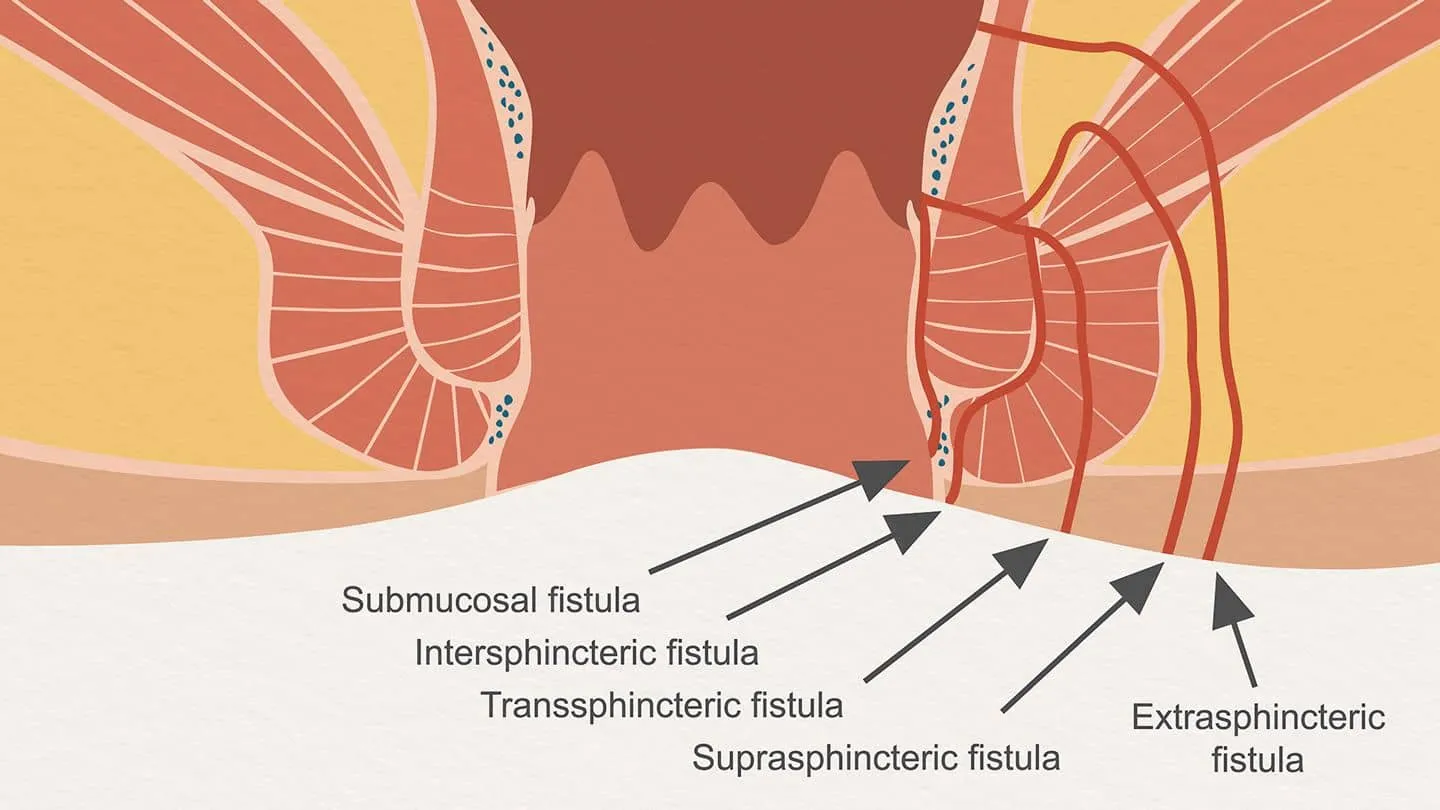Fistulas are abnormal tube-like connections between two organs or blood vessels within the body. If identified early, fistulas can be treated and prevented from progressing to an advanced stage. If left untreated, fistulas can affect a person’s quality of life. Fistulas are also challenging to treat in advanced stages. Therefore, it is essential to identify fistulas early to zero down on the fistula surgery that best suits you.
Read on to determine the best fistula surgical procedures if you or your loved one have a fistula or are struggling with its symptoms.
What Are the Different Stages of Fistula?
The classification of fistulas is essential to decide the treatment plan. The four different stages of fistula are as follows:
1. Intersphincteric fistula
The fistula penetrates the internal sphincter of the anus but does not extend to the external sphincter. In this stage, you may experience a continuous throbbing pain that may worsen with sitting, moving around, coughing or passing stool.
2. Transphincteric fistula
In this stage, the fistula passes through both the sphincters (internal and external). In this stage, you may experience symptoms such as skin irritation, throbbing pain, and a smelly discharge from your anus.
3. Suprasphincteric fistula
In this stage, the fistula passes through the sphincters and associates with the perineum (the skin between your genitals and anus). Symptoms of this condition include abscess formation, which can result in a smelly discharge and blood or pus discharge while passing stools. You may also need help in controlling your motions.
4. Extrasphincteric fistula
Though extra sphincteric fistulas are rare, in this stage, the fistula extends beyond the sphincters and involves the rectum and the perineum. You may have difficulty in controlling your bowel movements. You may also have a high fever due to pus accumulation.
What Are the Best Treatments for Fistulas?
The best treatments for fistulas are surgical and non-surgical approaches, followed by alternative medicinal approaches.
Here are the details:
1. Surgical Treatment
Fistula surgery is recommended for stages three and four of the fistula. Fistula surgery is a short procedure that requires only a day’s admission to the hospital. Therefore, the fistula surgery recovery is quick, and you can be home within the same day.
Following are the surgical treatment options for fistula:
- Fistulotomy- the complete fistula is cut to allow the fistula to heal like a flat scar.
- Endorectal advancement flap procedure– The fistula is cut and scraped and covered with a flap of rectal tissue.
- Ligation of the intersphincteric fistula tract (LIFT)- used for complicated anal fistulas. In this two-stage procedure, the sphincter muscles are spared, and a seton (i.e., an absorbent material placed underneath the skin to promote drainage) is placed into the fistula tunnel, enabling it to widen over time. After a few weeks, the infected tissue is removed, and the opening is closed.
- Laser surgery – a procedure in which laser beams are used to seal the skin affected by the fistula.
- Endoscopic ablation- a fistula surgical procedure in which an electrode that is passed through an endoscope seals the fistula.
2. Non-Surgical Treatment
The non-surgical treatment of fistula includes the following options:
- Medication- medicines like antibiotics may be prescribed if your fistula has led to an infection.
- Fibrin glue- In this non-surgical approach, glue is injected into the fistula, which helps to seal it and promote its healing.
- Bioprosthetic plug- If the fistula is not complicated, a cone-shaped plug made of animal tissue may be used to block the opening of the fistula.
- Seton placement- A seton (thin silicone string) is placed into the fistula to help drain the fistula.
3. Alternative Medical Management
Alternative treatments like homoeopathy, ayurveda, and home remedies may be used occasionally for treating fistulas. Unlike fistula surgery, these are only useful when the fistula is of a small size. In the advanced stages of the disease, fistula surgical procedures are most effective and recommended.
When Should You See Your Doctor for Fistulas?
The following symptoms of fistula require close medical attention that may lead to the need for fistula surgical procedures:
- Persistent and throbbing pain, aggravated by sitting, movement, bowel movements, or coughing.
- Foul-smelling discharge originating from the vicinity of the anus.
- Passage of pus or blood during bowel movements.
- Swelling and redness around the anus, are often accompanied by a high temperature if an abscess is also present.
To Sum it Up
Though a fistula will eventually require fistulasurgery, minimally invasive surgeries can help. Your doctor will let you know if minimally invasive surgeries are your best option. They need only a day’s admission; healing is faster, recovery is better, and you can quickly return to your daily activities. Contrarily open surgeries may delay fistula surgery recovery and increase your risks and complications after fistula surgery.
Smiles Gastroenterology is one of India’s first integrated hospitals that offer state-of-the-art minimally invasive surgeries to treat GI and colorectal disorders. They are a pioneer in this field. With their ethical, empathetic, and transparent care, Smiles Institute of Gastroenterology is your go-to choose for minimally invasive surgeries for GI-related issues like fistulas. Do not procrastinate. Watch out for your symptoms and get help now!
Call 8099008800 to book an appointment or visit: www.gastroenterology.smileshospitals.com.

